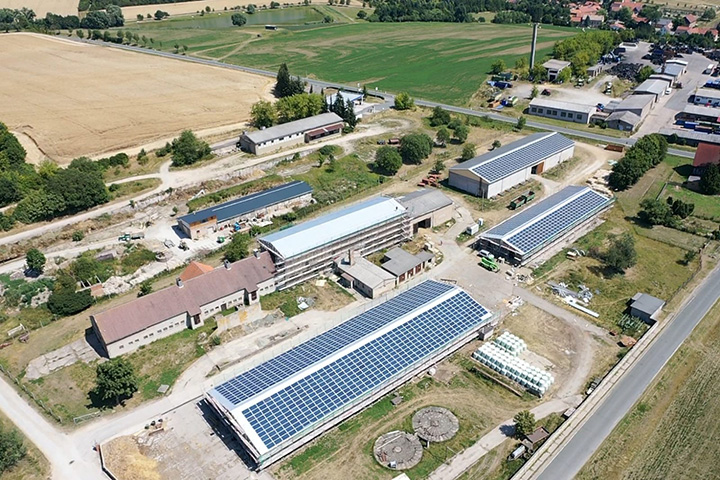Laatste Nieuws

Remda, Germany Reference Project - a 2 MWp commercial PV rooftop project
Project developer GreenRock Energy has installed a total of around 2MW of PV capacity on the roofs of three agricultural buildings in Remda, between Jena and Weimar in Thuringia, Germany. With the solar PV systems, the farmer wants to reduce his high electricity consumption and thereby lower his pig breeding operation costs.
From the end of 2019, two of the PV plants will feed electricity back into the grid at a fixed contractual price and the third plant will be used by the farmer for self-consumption. The size of the plants, 750 kWp x 2 for the grid feed-in and 500 kWp for the self-consumption, was deliberately chosen.
Before the PV systems were installed, extensive preparatory work had to be carried out on the roofs. 6,000 square metres of roof surface had to be completely renovated and freed of asbestos. After the roof renovation, structural insulated panels were installed. The installation of the solar PV system did not begin until this work had been completed. The many chimneys on the roofs were an additional challenge, as the associated shading meant that a lot of space for solar modules was lost. It was not possible to remove the chimneys.
In just six weeks, the three agricultural buildings with a total roof area of 15,000 square metres were equipped with 7,500 solar modules, which came directly from the company's subsidiary Greenrock Trina GmbH. Each of the Trina Honey polycrystalline modules supplies 275 watts from 60 cells. The assembly system for the solar modules consists of trapezoidal sheets and a substructure of 180mm aluminium rails supplied by the German company, Saytec.
The installation also includes 32 string inverters from Delta Electronics. Three power classes were installed: the M88H, the M50A and the M30A. The combination of inverters of different sizes serves the purpose of taking the special features of each roof into account and making optimum use of the roof surface.
Competition and cost pressure has increased enormously in the solar industry in recent years. This means that every tenth of a percentage point of efficiency counts. Cost pressure applies not only to solar modules but also to other components such as inverters. The M88H was specially developed for use in large solar parks and is available in two connection variants. It has a maximum efficiency of 98.5 per cent (EU value). "The M88H has one of the highest power outputs and is one of the most efficient string inverters on the market and ideal for large PV systems," says Martin Kofler, CEO of GreenRock Energy, as his company develops individual solutions. GreenRock has gained good experience with Delta inverters in several projects.
The total weight of the Delta M88H inverter is only 84 kilograms. Transport and handling at the installation site do not require any special and expensive equipment. Also, it features an impressive design concept, the terminal box with AC and DC surge arresters, terminals and DC disconnectors is already integrated into the device and can easily be disconnected from the power module. When the power module is replaced, the junction box with the entire cabling remains at the installation site, saving time and reducing maintenance and repair costs.
While two PV plants feed the electricity produced into the grid, the owner decided to use the third PV plant for self-consumption. The resulting 500,000 kilowatt-hours of energy is buffered in lithium batteries with a capacity of around 242 kilowatt-hours. This was installed under consideration of the agricultural environment as well as the climatic conditions. Soltaro's lithium iron phosphate storage system uses an efficient high voltage of 1,000 volts DC and is controlled via the energy management system from Smart 1 Solutions. The system optimizes energy distribution for private consumption and grid feed-in.
The owner of the PV plant receives electricity at a fixed price, which is ten percent below the tariff that the owner has paid to an energy supplier at the time a contract was concluded. The fixed price is valid for 20 years. The Remda project is the first reference project for GreenRock Energy to implement a rental electricity model that includes relatively large battery storage with 225 kilowatts of power.
GreenRock Energy AG calls this model s-plus. "Our idea is that as many people as possible can benefit from the advantages of a photovoltaic system without having to make investments," says CEO Martin Kofler. This gives customers planning security for 20 years through a fixed electricity price. From the 21st year, they will also receive a share of the plant's income. As part of the Avalanche programme, they can also participate in the revenues of other plants by making a recommendation. This is a new approach that has a great deal of potential for ensuring that photovoltaic systems are increasingly built across the board in Germany, irrespective of the requirements of the EEG (Erneuerbare-Energien-Gesetz, the renewable energy law in Germany).
Delta is proud to be able to provide its high-efficiency inverters for GreenRock Energy's PV project in Remda. Still another example of solar PV used to create financial benefits by reducing the customer's electricity bills and at the same time creating environmental benefits with the production of clean solar electricity.

